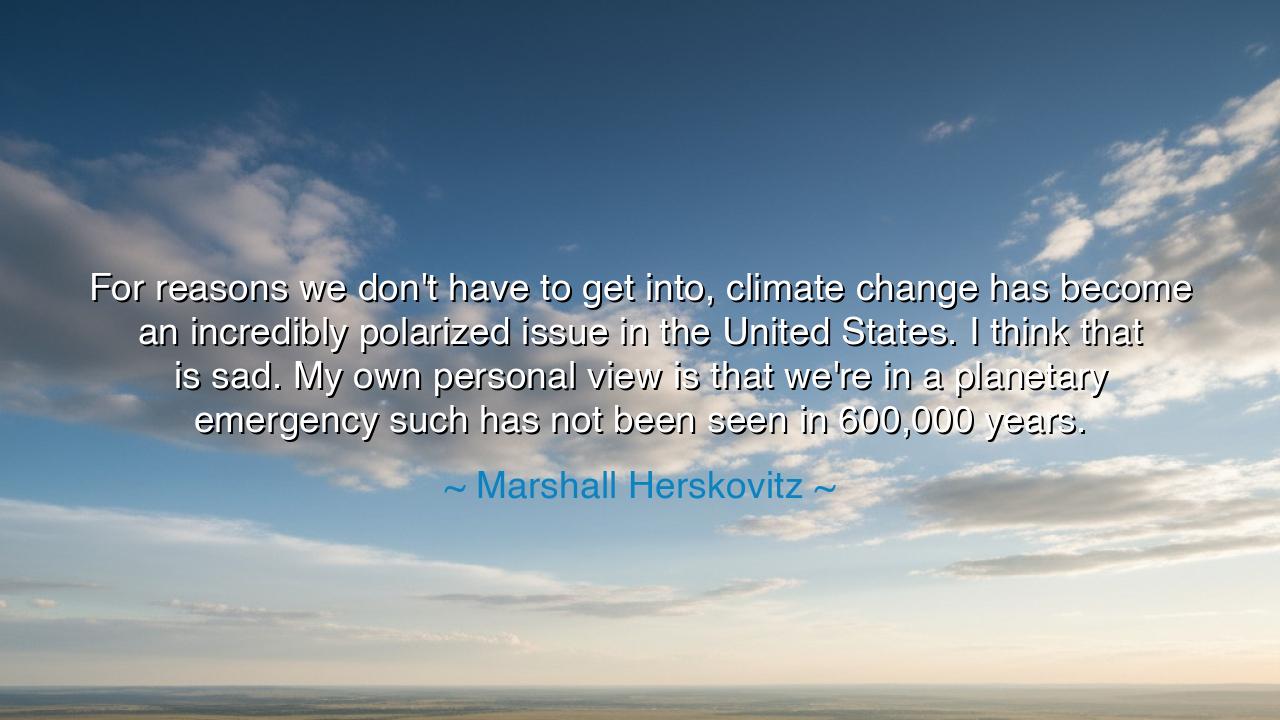
For reasons we don't have to get into, climate change has become
For reasons we don't have to get into, climate change has become an incredibly polarized issue in the United States. I think that is sad. My own personal view is that we're in a planetary emergency such has not been seen in 600,000 years.






Hear now the words of Marshall Herskovitz: “For reasons we don't have to get into, climate change has become an incredibly polarized issue in the United States. I think that is sad. My own personal view is that we're in a planetary emergency such has not been seen in 600,000 years.” This utterance is no passing remark; it is the cry of one who sees the earth trembling beneath our feet and laments that its children quarrel among themselves while the storm gathers. It is the cry of a seer who beholds both the peril of division and the immensity of the danger.
The ancients would have called this a warning of the gods, for when the river floods its banks or the fire burns through the forest, the wise do not argue about names or allegiances—they act to preserve life. Yet in our age, men and women of the same land are sundered by partisan strife, debating not whether the heavens grow hotter and the seas rise higher, but whether the very truth of the peril exists. Herskovitz names this sorrow—he calls it sad—for what grief is greater than to see one’s kinship divided when unity is needed most?
History has shown us such blindness before. Recall the tale of ancient Troy, whose people quarreled within their walls while the wooden horse was wheeled through their gates. They argued over pride, over honor, over suspicion, but did not see the danger until flames consumed their towers. In like manner, humanity now stands divided, some blinded by wealth, others by fear, others still by stubborn disbelief. Yet the danger, unlike the Greeks at the gate, is not a foe of men’s making alone, but a planetary force unleashed by our own neglect.
The 600,000 years Herskovitz invokes is not idle poetry—it speaks of the cycles of earth itself, of ages when glaciers advanced and withdrew, when life was tested by fire and ice. Never before in such a span has the hand of humankind pressed so heavily upon the balance of creation. We are, as he declares, in a planetary emergency: storms more fierce, forests more brittle, oceans more swollen with salt and heat. And while the earth endures, the question is whether humanity, in its folly, will endure with it.
Yet this is not only a tale of doom, but also of choice. Consider the example of the people of the Netherlands, who for centuries held back the sea with dikes, windmills, and unyielding cooperation. They did not quarrel over whether the water would rise; they bound themselves together in common labor, for survival demanded unity. So too must we: instead of allowing polarization to sunder us, we must find our common cause, for no border, no creed, no faction will escape the rising tide.
The lesson, then, is clear: lamentation alone is not enough. To those who hear these words, I say—live with eyes open. Acknowledge the emergency, and speak truth even when the world turns its face away. Do not be content with apathy; plant trees, reduce waste, support leaders and builders who honor the earth, and above all, refuse to be drawn into the blindness of division. Each small act, though it seem but a grain of sand, is a part of the wall that might yet hold back the flood.
And finally, let us not forget the deeper teaching hidden in Herskovitz’s grief: that the saddest thing is not the peril itself, but the hearts of men estranged from one another. Unity is the weapon stronger than any machine, stronger even than the rising seas. If we would survive this age of trial, we must become as one family, guardians of the same earth, servants of the same flame of life. Then, and only then, will we rise from peril into hope, and future generations shall say: They faced the storm together, and together they endured.






AAdministratorAdministrator
Welcome, honored guests. Please leave a comment, we will respond soon